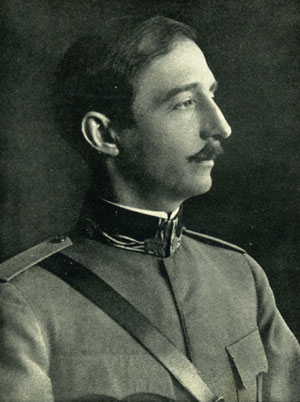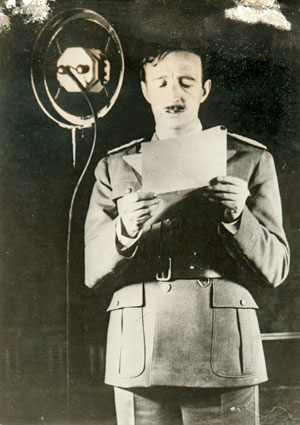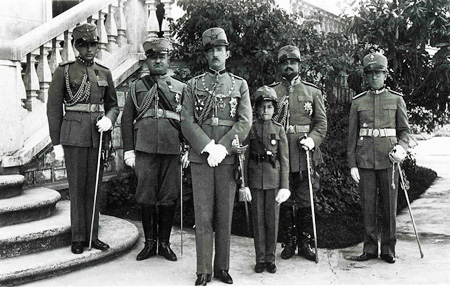

King Zog at the inauguration of Radio Tirana
on 28 November 1938.
AL Voices | Robert Elsie
1930 | King ZOG


Ahmet Zogu, known abroad more commonly as King Zog, was born on 8 October 1895 in Burgajet in the Mat district, as a distant relative of Essad Pasha Toptani. He spent his early years, from 1903 to August 1912, in Istanbul and commanded an Albanian volunteer brigade fighting on the side of Austria-Hungary during World War I. He took part in the Congress of Lushnja in 1920, and in the period 1920-1922 served as minister of the interior under Sulejman bey Delvina and then as minister of defence. On 2 December 1922, he formed a conservative government himself and held onto power until 23 February 1924, when an assassination attempt was made on his life. Zogu fled to Yugoslavia after the Democratic Revolution, which saw the ephemeral rise to power of Fan Noli. There, with Yugoslav support, he organized volunteer corps and returned to take over Albania. His forces occupied Tirana on 24 December 1924, bringing an end to the democratic experiment.
On 15 January 1925, Zogu formed a new cabinet, declared Albania, which was nominally still a monarchy under the exiled Prince Wilhelm zu Wied, to be a republic and made himself president thereof on 31 January of that year. Despite the fact that he had come to power with Yugoslav support, he began to ally himself increasingly with Yugoslavia’s rival on the Adriatic, fascist Italy. After an initial trade agreement between Albania and Italy, the two countries signed a first Pact of Tirana on 27 November 1926 and a second Pact of Tirana on 22 November 1927, the latter providing for mutual assistance in case of attack. These treaties gave Italy de facto control over Albania as a protectorate.
On 1 September 1928, with Italian support, Zog declared himself Zog I, King of the Albanians. In January 1931, he travelled to Vienna for health reasons, and on the evening of 20 February an attempt was made to assassinate him as he was leaving the Vienna opera house after a performance of Pagliacci. One member of his entourage was killed and one was wounded, but the king, who had shot back himself, survived the attack unscathed and returned to Tirana at the end of March 1931. His attackers, Aziz Çami, a southern Albanian communist, and Ndoc Gjeloshi, a conservative Catholic from Shkodra, were subsequently sentenced to prison by the Austrian authorities.
Over the coming decade, the authoritarian monarch endeavoured to maintain a degree of independence from Mussolini’s increasingly colonialist designs, but, in the end, he was forced to give in. When Italian troops invaded Albania on Good Friday, 7 April 1939, with the firm intention of staying, Zog and his family, Queen Geraldine and their newly born son Leka, fled overland to Greece and went into exile to England in 1940, holding court at the Ritz Hotel in London and then at Parmoor House in the Thames Valley. From 1946 to 1955, the royal family lived in Egypt under King Farouk (1920-1965), who was himself of Albanian origin. There, Zog reorganized the monarchist Legality movement and endeavoured to gain the support of anticommunist Albanians in exile, but with limited success. After the deposition of King Farouk in 1952, Zog and his family moved to Cannes on the French Riviera. He died of stomach cancer in Suresnes near Paris on 09 April 1961 and is buried there.
This short tape from October 1930 is very possibly the only recording of the voice of King Zog. It stems from the archives of his son, Prince Leka, to whom we are grateful for access to it. The recording is a brief address in which the king proclaims to his soldiers:
“I am particularly happy to note, to observe with my own eyes the solid steps the Albanian army has taken towards discipline and progress. Let us shout: Long live the army, long live the armed forces of the Albanian people.”
Hurrah, hurrah! Long live the king! Long live the king!!
TOP
